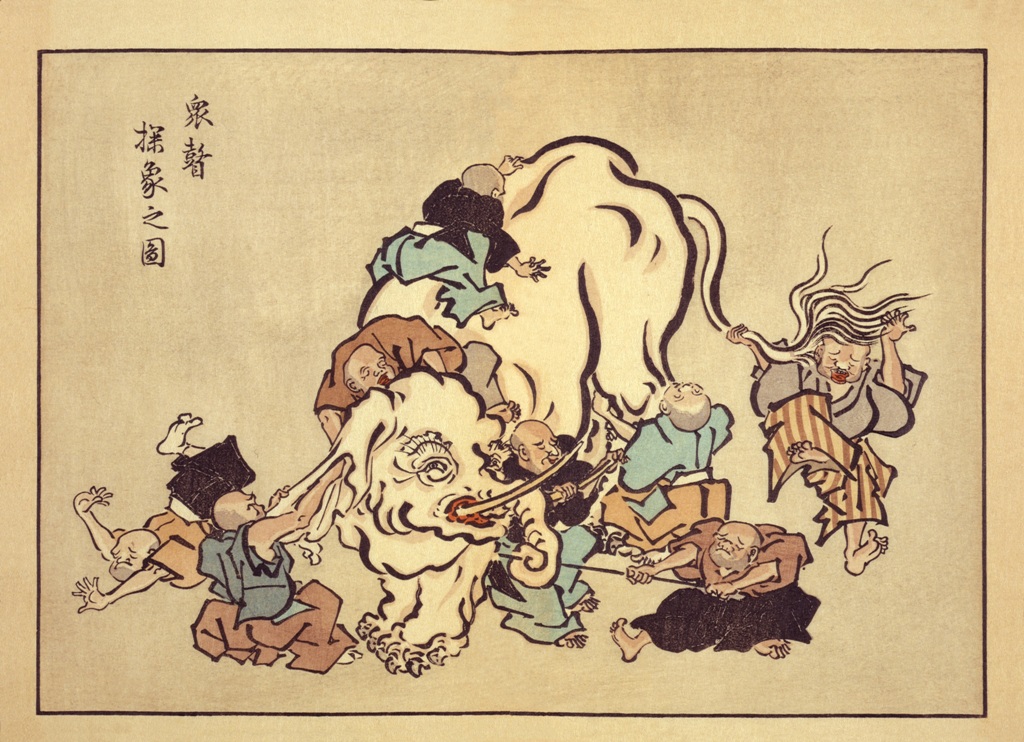(19) To Find a Lost Sword by a Boat-Mark
Once upon a time a swordsman accidentally dropped his sword from his boat while crossing a river. He immediately made a mark on the side of the boat, so he would find his sword later, using the mark for reference.
An onlooker chuckled and commented that he would never find his lost sword that way.
The swordsman defended his action, saying: “It is on this very spot in the river that my sword was dropped. I will find it for sure under water where this mark shows.”
-----------------------------------------------------------------------------------------------------------------------------------------------
Note: This is an English narration of an allegory in the book 《呂氏春秋》. The title of the original story 刻舟求劍 has become a proverbial phrase to say `a futile act`.
楚人有涉江者,其劍自舟中墜於水,遽契其舟,曰:「是吾劍之所從墜。」舟止,從其所契者入水求之。舟已行矣,而劍不行,求劍若此,不亦惑乎?_______________________________________________________________________________________
(20) How the Blind See an Elephant
Once upon a time, an emperor planned to train his ministers to broaden their minds. He had an elephant in his court one day, and asked six blind men each to describe what they saw.
The first one touched the tusks and said: “An elephant is a spear.”
The second said: “No, it is a wall.” He was feeling the animal’s body.
The third said: “It is more like a rope.” He was holding the trunk.
The fourth one said: “I can use it for shade, because it is like a big hat.” He was stretching his hands on the elephant’s ear.
The fifth one said: “It is a big mansion supported by four pillars.” He went around feeling the animal’s four legs.
The sixth one was very sure that an elephant was a big ball, for he was playing with the eye.
The emperor then had the elephant and men removed. He told his ministers: “Do not insist on your perceptions or views on anything. Often, what you see are but fragments of the truth. On the other hand, if you accept the views of others, you will have the whole picture of how things are.”
--------------------------------------------------------------------------------------------------------------------------------------------------------------------
Note: This is an English narration of an allegory in the Buddhist classic 《涅槃經.師子吼品》. The original title of the story 盲人摸象 has become a proverbial term to teach people to learn the whole truth, rather than the parts. This story has been used as a Chinese language lesson for Grade 3 in elementary schools.
Six Blind Men of Indostan by John Godfrey Saxe (1816-1887)
______________________________________________________________________________________________________________
(21) Butterfly Dreams
A father was reading a bed-time story to his daughter. She was four years old. They clutched together in bed comfortably.
“A long time ago, there lived a very wise man by the name of Zhang Zi(莊子).He was very intelligent and imaginative…”
“More so than me?” The daughter interrupted.
“Yes, dear,” the father answered and continued: “He had a dream one night when he turned into a happy and free butterfly. When he woke up in the morning, he pinched himself to make sure he was Zhang Zi and not a butterfly…”
“I know, I know,” the daughter interrupted again, “He was suspicious that the butterfly in his dream might not be real. So he questioned who actually the dreamer was.”
“You are indeed imaginative, dear.” the father praised. He continued: “But Zhang Zi knew he was the dreamer. He pinched himself. And he felt pain. He was alive.”
“No, he was not sure. At least he did not want to be sure.”
“What makes you think so?”
“My i-phone said so. And I believe Zhang Zi wanted to be happy and free.”
“Don’t always believe in your i-phone.”
“I said I believe, Dad.”
“Good night, dear. We will read more stories tomorrow.”
“Good night Dad. May be I’ll have a dragon dream tonight.”
------------------------------------------------------------------------------------------------------------------------------------------------------------------
Note: This is my telling of an allegory in the book Zhangzi《莊子》where Zhangzi created a double transformation between a happy butterfly and a curious man. His passage titled 莊周夢蝶 has been a popular illustration of human imagination and desire for freedom.




